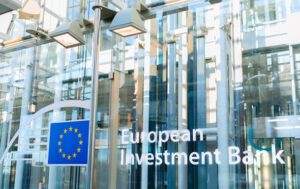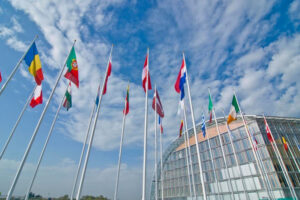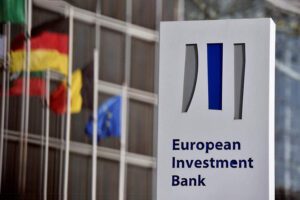
Ukraine Recovery Vice Prime Minister Oleksandr Kubrakov and President of the European Investment Bank (EIB) Werner Hoyer signed a Memorandum of Understanding on cooperation in Ukraine recovery projects envisaging allocation of EUR 840 million in 2023.
According to the press service of the Ministry of Community Development, Territories and Infrastructure, the memorandum, signed during the Ukraine Recovery Conference 2023 (London, June 21-22), provides for the allocation of EUR840 million for the implementation in 2023 of priority projects to restore the infrastructure of Ukraine.
Kubrakov reminded that since the beginning of Russia’s full-scale invasion, the European Investment Bank has allocated EUR 1.7 billion in emergency aid to Ukraine. This money was used for the needs of the state budget and supported the economy of Ukraine.
“Today we are expanding our cooperation on the reconstruction of Ukraine. We will work together on a number of projects aimed at restoring municipal and transport infrastructure, improving energy efficiency, etc. We appreciate the support the Bank has already provided to Ukrainians, and we thank EIB President Werner Hoyer for his cooperation and the Bank’s critical role for Ukraine’s sustainability during the war,” Kubrakov said.
It is noted that EUR840 million, envisaged by the Memorandum, will be used for preparation, evaluation, financing and implementation of projects on reconstruction of municipal infrastructure (schools, hospitals, etc.); public buildings with consideration of energy efficiency; water supply and sewage infrastructure; transport networks and public transport.
The EIB will also finance the development of digital transformation and the strengthening of cybersecurity.
In addition, the Memorandum provides for the cooperation of Ukraine and the EIB on the use of a special trust fund from the EIB – EU for Ukraine Fund and lending projects in Ukraine with the support of the European Fund for Sustainable Development Plus (EFSD +) guarantees.
The Ministry of Reconstruction and the EIB will work on the implementation and application of a package of technical and consulting assistance for Ukraine worth about EUR100 million.
The European Investment Bank is one of the largest creditors of Ukraine. To date, the EIB’s portfolio of projects with the Ukrainian public and municipal sectors and businesses reaches more than EUR 7 billion.

The European Investment Bank (EIB), together with the Ministry for Communities, Territories and Infrastructure Development of Ukraine, announced the launch of the selection of projects for the recovery, rebuilding and overhaul of schools, kindergartens, administrative centers and housing and utility services, and providing housing for internally displaced persons (IDPs), the press service of the Ministry of Restoration has said.
The projects will be implemented through financial agreements between Ukraine and the EIB. These are the Ukraine Recovery Programme (projects from local governments) and the Emergency Loan Program for the Reconstruction of Ukraine (projects of public utilities and municipalities).
As the ministry said in the press release, the projects will be implemented in regions affected by the armed aggression of the Russian Federation and faced a burden on social infrastructure due to a significant number of IDPs. The project implementation period is from one to three years, depending on the programme. The funds will be sent to the communities as a subvention from the state budget.
The deadline for submitting projects for participation in the Ukraine Recovery Programme is until June 25, 2023, in the Emergency Loan Program for the Reconstruction of Ukraine – until June 2.

The European Investment Bank (EIB) will provide EUR 1.59 billion supported by guarantees from the EU budget, to help Ukraine repair the most essential damaged infrastructure and resume critically important projects addressing the urgent needs of Ukrainian people, the European Commission said on Tuesday.
“This EIB support will keep strategic public sector companies financially viable and able to carry out urgent repairs of critical infrastructure, resume the provision of essential services and address other immediate needs of the Ukrainian people, including those displaced by Russia’s war,” European Commission Executive Vice-President Valdis Dombrovskis said.
He assured that “the European Commission will keep working with EU Member States and our international partners to support Ukraine on every level — for as long as it takes.”
The European Commission said that This is the second package of support for Ukraine under the EIB Ukraine solidarity urgent response developed in close cooperation with the European Commission. It follows an emergency support package of EUR 668 million.
Like the first one, this new financing is offered at favourable terms including long tenors.
The bank will immediately disburse EUR 1.05 billion. It will help the Ukrainian government to cover priority short-term financing needs, provide support to strategic state-owned companies, ensure urgent repairs of damaged infrastructure, resume the provision of disrupted municipal services, and support urgent energy and energy efficiency measures in preparation for the cold season.
Another EUR 540 million will be used to resume implementation of EIB-financed projects in Ukraine where possible. The selected projects will cover energy, energy efficiency, roads, transport, education and infrastructure, as well as reconstruction and recovery programmes, the European Commission said.

The European Investment Bank (EIB), with the support of the EU budget, has approved funding for Ukraine in the amount of EUR1.59 billion, of which EUR1 billion will be provided immediately, President of the European Commission Ursula von der Leyen said.
“The EIB, with EU budget support, approved EUR1.59 billion of financing for Ukraine, with EUR1 billion to be released immediately. It will help rebuild infrastructure and resume services. And support energy, transport and education projects for the future,” she said on Twitter.
“This is the second package of support for Ukraine under the EIB Ukraine solidarity urgent response developed in close cooperation with the European Commission. It follows an emergency support package of EUR668 million fully disbursed within a month of the war’s beginning. Like the first one, this new financing is offered at favorable terms including long tenors,” the EIB said on its website.
“Immediate financial assistance will total EUR1.05 billion. This will consist of upfront disbursements under eight existing finance contracts. It will help the Ukrainian government to cover priority short-term financing needs, provide support to strategic state-owned companies, ensure urgent repairs of damaged infrastructure, resume the provision of disrupted municipal services, and support urgent energy and energy efficiency measures in preparation for the cold season,” the report says.
“The second block will be resuming implementation of EIB-financed projects in Ukraine totaling EUR540 million where possible, excluding areas of active hostilities and territories not controlled by the Ukrainian government. The selected projects will cover energy, energy efficiency, roads, transport, education and infrastructure, as well as reconstruction and recovery programs. The exact timing of these disbursements will depend on the state of advancement of underlying projects,” the release reads.
“The European Commission will keep working with EU member states and our international partners to support Ukraine on every level — for as long as it takes,” Valdis Dombrovskis, European Commission Executive Vice President, said.
“To rebuild Ukraine, we need strong global support and growing financial assistance. I am grateful to the EIB and the European Union for the long-standing cooperation and financial support and for standing with Ukraine for as long as it takes,” Finance Minister of Ukraine Serhiy Marchenko said.

The European Investment Bank (EIB) is preparing a EUR 4 billion financing program that will help EU member states take in Ukrainian refugees fleeing the war, as well as ensure the development of critical social infrastructure.
“The new EIB program, pending approval by the EIB’s Board of Directors, aims to finance the development of key social infrastructure for the provision of public services to refugees, including housing, schools, hospitals and kindergartens. The financial support will be complemented by advisory support, helping local authorities in EU Member States with free technical assistance to assess local needs rapidly, and plan, prioritize and prepare the related investments,” the bank said on its website.
“The EIB pledged the support for refugees at Stand Up for Ukraine, a global fundraising event in Warsaw to support the victims of the Russian aggression,” the report says.
“We are all devastated by the terrible destruction inflicted on Ukraine and its people, millions of whom are fleeing their country in search of peace and security. The horror we are witnessing strengthens our determination to act. With our initial Solidarity Package for Ukraine, and this new EUR 4 billion program for EU Member States, we will support Ukraine and help communities welcoming the refugees, ensuring they can offer them vital social facilities – housing, schools, hospitals. I am deeply grateful to President Ursula von der Leyen and Prime Minister Justin Trudeau for their leadership and for mobilizing the international community for Ukraine. The world must live up to the exemplary courage and resilience of the Ukrainian people and help them and those who support them,” EIB President Werner Hoyer said.

The European Investment Bank (EIB) is preparing a EUR4 billion financing program that will help EU member states take in Ukrainian refugees fleeing the war, as well as ensure the development of critical social infrastructure.
“The new EIB programme, awaiting Board approval, aims to finance the development of key social infrastructure to provide public services for refugees, in particular housing, schools, hospitals and kindergartens,” the bank said on Saturday.
The EIB has pledged to support communities to receive refugees and provide them with critical social services during the international fundraising event in support of the victims of Russian aggression “Stand up for Ukraine”, taking place in Warsaw on this day and organized by the European Commission, the Government of Canada and Global Citizen.
The financial assistance will be complemented by free advisory support to assist local authorities in EU Member States in rapidly assessing local needs and in planning, prioritizing and preparing appropriate investment projects.
“We are all stunned by the terrible destruction inflicted on Ukraine and its citizens, millions of whom are fleeing the country in search of peace and security. The horror that we are witnessing only strengthens our resolve to act,” Bank President Werner Hoyer was quoted in the release as saying.
Through our initial Solidarity Package with Ukraine and this new 4 billion euro program for EU member states, we will support Ukraine and also help: with housing, schools, hospitals. I am deeply grateful to President Ursula von der Leyen and Prime Minister Justin Trudeau for their leadership and for mobilizing the global community for Ukraine. The world must match the exemplary courage and resilience of Ukrainians, as well as help them and those who support them.”
The bank recalled that from March 8 to March 25 it had already transferred EUR668 million to the government of Ukraine for emergency liquidity support.
In addition, the EIB is working to provide further funding to enable the government of Ukraine to continue to provide critical public services for citizens remaining in Ukraine. According to the agreements between Hoyer and Prime Minister of Ukraine Denys Shmygal, these funds are provided to support transport, energy, urban development and digital projects.
The EIB will continue to explore opportunities to support Ukraine and Ukrainian refugees together with the European Commission, in particular through the Social Investment and Skills Window component of the recently launched InvestEU programme, the report also says.
According to the UN, Russian aggression against Ukraine has resulted in 7.1 million internally displaced persons and 3.8 million refugees.
The EIB is the long-term lending institution of the European Union. Its owners are the member states of the European Union. The Bank provides access to long-term financing for prudent investment in order to implement European Union policies.